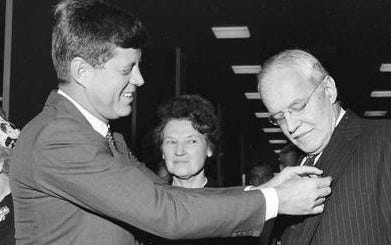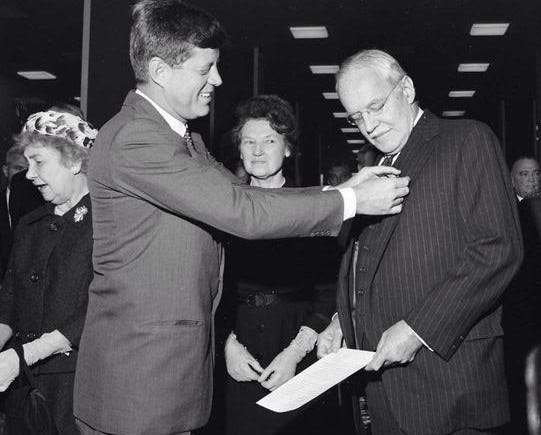Spies, Media, and the Assassination of Democracy
Why what the CIA did 60 years ago still matters
As agents of the American Establishment, US media figures like Naomi Klein in The Guardian and Joan Walsh in The Nation have attacked Robert F. Kennedy Jr.’s presidential campaign with unprecedented ferocity.
In response, Kennedy has delivered speeches, given interviews, appeared on numerous podcasts, and made social media posts of his own about, as he said, the “coordinated attacks in Time, WaPo, NYT, Guardian, etc.” That such corporate media outlets use the same language against him, he has stressed, “exposes fear in the ranks of the corporate oligarchy.”
Talking about a seemingly unrelated issue, Kennedy has elsewhere explicitly stated that his uncle, President John F. Kennedy, sought to reverse what he thought was a tragic US error: the decision to take over the British role as a global empire after World War II.
These two issues—the corporate media propaganda machine of today and the postwar creation of a global US Empire—are in fact much more intimately related than people recognize. Understanding them is essential for those who wish to see RFK Jr. successfully lead a political movement against top-down corporate rule. As such, one aim of his campaign is to educate the public as to how we as a nation have found ourselves in such dire political circumstances. In that spirit, it is important to understand how a top-down system was established and expanded in the crucial years before John F. Kennedy became President.
Allen Dulles, the late director of the CIA and a corporate lawyer, may be the most important figure to help one understand how and why the US became a global empire after World War II. As Wall Street’s Council of Foreign Relations (CFR) was drafting the War and Peace Studies Project during World War II, Dulles was a CFR Vice-President. In this capacity, Dulles was one of the key architects of the study. According to Professor Peter Dale Scott, still-classified sections of the report likely called for the creation of a clandestine intelligence service, something novel at that point in US history.
After working on the plans for postwar US Empire, Dulles—a Wall Street lawyer for Sullivan and Cromwell—joined the wartime intelligence service, the Office of Strategic Services (OSS). Most notably in this capacity, US spies kept one eye on the war and another on the postwar US empire. To create the clandestine paramilitary networks that would be needed for a postwar US empire, Dulles and other spies like James Angleton essentially rescued and recruited fascist war criminals like Karl Wolfe, Otto Skorzeny, Klaus Barbie, Yoshio Kodama, and “Black Prince” Junio Valerio Borghese.
Dulles and Angleton knew that these fascist terrorists had skill sets that would be useful after war. Namely, they would kill leftists. This was what had made the fascists attractive to segments of the US corporate oligarchy during the prewar era (see image below). Such would include JP Morgan, named by retired Marine Corp Major General Semdley Butler as a co-conspirator in a plot to overthrow FDR.
For overtly fascist leaders, democracy can be overridden by means of state lawlessness—by terror and violence, in other words. In our time, we also see that control over corporate media is routinely used to override democracy and allow for top-down rule. In the overtly fascist axis countries, formally authorized state violence was assisted by massive amounts of propaganda. Since the US regime was legitimized by democracy and political rights, any repressive apparatus would have to be covert.
Therefore, it came to pass that shortly after the war ended, figures representing the Wall Street overworld plotted to create a clandestine intelligence service for the US. In 1945, Dulles (still with Wall Street’s Sullivan and Cromwell) was named President of the CFR. In 1946, according to Richard Helms, Dulles was tasked with “draft[ing] proposals for the shape and organization of what was to become the Central Intelligence Agency (CIA).” Dulles then assembled an advisory panel of six men, five of whom were lawyers or investment bankers on Wall Street. In 1947, the CIA was established through Congress’ National Security Act. In that legislation, another corporate lawyer (Clark Clifford) penned a seemingly innocuous “elastic” passage that was soon stretched to authorize all manner of covert dirty tricks—including assassination programs, mind control techniques, propaganda, and alliances with criminal organizations.
Much has been written about the horrors that flowed from these fateful decisions. For our purposes here, we can focus on how the Wall Street overworld exploited this clandestine netherworld to undermine US democracy for power and profit. This was a major factor in the rise of the “corrupt merger of state and corporate power” that RFK Jr. is fighting in his 2024 campaign.
As discussed in Part 1 of this series, Henry Luce best represents the overlap between the Wall Street overworld and the US establishment media. Similarly, Dulles is the key figure illuminating the nexus between Wall Street and the so-called “intelligence community.” Another key figure of the era is journalist and columnist, Joseph Alsop—the man who perhaps best illustrates the corrupt Cold War relationship between the CIA and the US media.
In 1977, Alsop, a Yankee blue blood, admitted to performing a number of “tasks” for the CIA while under cover as a newspaper columnist. These “tasks” included a mission to Laos in 1952 and a 1953 trip to the Philippines for the purposes of boosting the country’s favored US puppet ruler, Ramon Magsaysay. Alsop would go on to play a key role in the cover-up of the JFK assassination, as we’ll see.
In the early years of the CIA, the agency assembled a sprawling network of media assets. When CIA officer Frank Wisner came across reporting that went against the CIA’s preferred narrative, Wisner would spring into action, demanding, “Get something out! The Mighty Wurlitzer!” The term was a reference to the Wurlitzer brand of organs whose music could drown out all other noise.
Estimates vary as to the scale of such operations. In the early 1970’s, the Agency asserted that they only used “some three dozen” reporters. Congress, in a 1976 inquiry, found that the number was closer to fifty. One year later, Carl Bernstein reported that as many as 400 US reporters had done work for the CIA since 1952.
It wasn’t just reporters who worked with the Agency. New York Times publisher Arthur Sulzberger—a close friend of CIA founding father, Dulles—actually signed a secrecy agreement with the CIA and tasked subordinates to act as liaisons between the paper and the Agency.
During the Eisenhower years, the CIA could count on the national media to present the best picture of US foreign policy to the public. As a result, Americans were kept in the dark about much of the Cold War, especially when it came to illegal covert operations like the overthrow of democratic governments in Iran (1953) and Guatemala (1954), or the assassination of Patrice Lumumba, former Prime Minister of the Democratic Republic of theCongo (1961).
Following the Bay of Pigs fiasco, President Kennedy fired Agency director Dulles and other top CIA officers responsible for the debacle. As Robert Kennedy Jr. often mentions on the campaign trail, his uncle felt sandbagged by the CIA and Pentagon over Cuba. Top national security officials knew the mission was not going to succeed, but pressured Kennedy anyway, believing that he would send in the military rather than accept defeat. In the end, they badly misjudged the new president.
In the aftermath of the Bay of Pigs, JFK told an aide that he planned to “smash the CIA into a thousand pieces and scatter it to the winds.” Interestingly, it was apparently Alsop and Dulles who briefed JFK before his 1960 debate with Nixon. In that debate, Kennedy famously took more hawkish positions on nuclear missiles and on the issue of Cuba. This may have wedded JFK to the Eisenhower-Nixon plan for the Bay of Pigs invasion. However, when the moment of truth arrived and it was clear that the exiles’ invasion had failed, Kennedy refused to cross the Rubicon by launching a military invasion of the island.
From the White House, the Kennedys tried to use the media to their advantage with some success. One of President Kennedy’s best friends was Newsweek reporter Ben Bradlee, a Georgetown neighbor and a supportive journalist on the campaign trail. In general, JFK was adept at finessing the national media with his rhetorical skills, his charisma, and his quick wit. But there were problems.
The Kennedy brothers tried and failed to use the media, Hollywood specifically, to warn the public about specific dangers to US democracy. Robert F. Kennedy was unsuccessful in his attempt to get a Hollywood adaptation made of his organized crime exposé, The Enemy Within. Despite the power and wealth of the Kennedys and despite having Paul Newman on board to star in the film, no studio would make the movie after Jimmy Hoffa’s Teamsters made it clear that they would do everything in their power to stop production if the film went forward. President Kennedy did persuade his friend, John Frankenheimer, to direct a film adaptation of Seven Days in May, a cautionary novel about treasonous military officers who plot a coup to oust a president who wants peace with the Soviet Union. Unfortunately, JFK was dead before the film hit theaters.
As it happened, in early October 1963, the month before the assassination, items appeared in the Washington Daily News and New York Times which quoted an unnamed high US official stating that, “If the United States ever experiences a Seven Days in May [i.e., a coup], it will come from the CIA and not the Pentagon.”
One month later, in November of 1963, the US did experience just such a coup.
As Robert Kennedy Jr. has flatly stated, “There is overwhelming evidence that the CIA was involved in his murder. [It is] beyond a reasonable doubt at this point.” True to form, the CIA and the national media have, ever since, circled the wagons to obscure yet another crime of the clandestine state—this one on American soil.
In the aftermath of the assassination, Malcolm X infamously said, “President Kennedy never foresaw that the chickens would come home to roost so soon.” But JFK did foresee such a possibility; he even tried to preempt or deter it somehow with a warning in the form of a Hollywood film.
Nevertheless, it is noteworthy that after almost 60 years, a major presidential candidate is today essentially echoing Malcolm’s explanation of what happened in Dallas.
Note: In Part 1 of this series, I discussed how the US oligarchy of corporate wealth made the fateful decision to pursue global empire during World War II. We also looked at how the media, led by Time-Life tycoon Henry Luce, sold the concept of global empire to the American public. This is all relevant background for those of us who want to understand what we are facing—a profound crisis, which Robert Kennedy Jr. describes as “the corrupt merger of state and corporate power that is threatening now to impose a new kind of corporate feudalism on our country.”
In the next and final article of this series, I will look at how the CIA-friendly American media failed to confront harsh truths in the wake of the JFK assassination.








On this speech, when President John F Kennedy is mentionning Secret Society and what they are doing, you have to undersatnd that ¨Secret Society¨ is the CIA.
He also asked for the help of the media, quoting the First Amendment. Unfortunately, as we now, it never came and the medias are still under control.
The good news is that we have internet now, so it is up to us to inform others.
¨No President should fear public scrutiny of his program. For from that scrutiny comes understanding; and from that understanding comes support or opposition. And both are necessary. I am not asking your newspapers to support the Administration, but I am asking your help in the tremendous task of informing and alerting the American people. For I have complete confidence in the response and dedication of our citizens whenever they are fully informed.
I not only could not stifle controversy among your readers--I welcome it. This Administration intends to be candid about its errors; for as a wise man once said: "An error does not become a mistake until you refuse to correct it." We intend to accept full responsibility for our errors; and we expect you to point them out when we miss them.
Without debate, without criticism, no Administration and no country can succeed--and no republic can survive. That is why the Athenian lawmaker Solon decreed it a crime for any citizen to shrink from controversy. And that is why our press was protected by the First Amendment-- the only business in America specifically protected by the Constitution- -not primarily to amuse and entertain, not to emphasize the trivial and the sentimental, not to simply "give the public what it wants"--but to inform, to arouse, to reflect, to state our dangers and our opportunities, to indicate our crises and our choices, to lead, mold, educate and sometimes even anger public opinion.
This means greater coverage and analysis of international news--for it is no longer far away and foreign but close at hand and local. It means greater attention to improved understanding of the news as well as improved transmission. And it means, finally, that government at all levels, must meet its obligation to provide you with the fullest possible information outside the narrowest limits of national security--and we intend to do it.¨ Read More
https://www.jfklibrary.org/archives/other-resources/john-f-kennedy-speeches/american-newspaper-publishers-association-19610427
President John F Kennedy Secret Society Speech 5:18 min https://rumble.com/v1v9swy-john-f.-kennedys-last-speech-to-the-public-secret-societies.html
The deep state run media used Trump Derangement Syndrome - TDS - as a way to brainwash millions of liberals who used to think twice about foul play within the government and its covert operations. The nonstop nonsense reporting about Trump (now joined by Putin) being Hitler on steroids set the stage for many to become mesmerized to believe any and all lies they are fed. Calling RFK Jr “dangerous” is a blaring example.